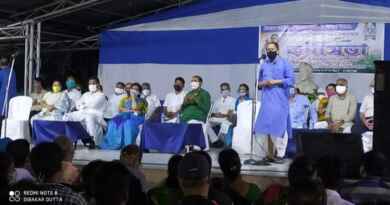Manipal Hospital Kolkata hosts in-depth discussion on Medical Ethics at the Annual Meeting of the Society for Heart Failure and Transplantation
Ambar Bhattacharya, Takmaa News, Kolkata, 17th Aug 2025 : Manipal Hospital, EM Bypass, in association with the Society for Heart Failure and Transplantation, brought together eminent medical experts, administrators, and ethicists for an in-depth discussion on “Medical Ethics: A Wide-Reaching Perspective” as part of the Society’s Annual Meeting held in Kolkata. The session was moderated by Dr. Kunal Sarkar, Senior Consultant – Cardiovascular & Thoracic Surgery, Manipal Hospital, EM Bypass, and Organizing Secretary of the Society for Heart Failure and Transplantation, under the leadership of Dr. Julius Punnen, President of the Society.
The discussion centered around one of the most ethically complex areas in critical care — the withdrawal of life-sustaining therapies in transplant or Mechanical Circulatory Support (MCS) patients. The focus was on the dilemmas involved in discontinuing advanced life-support systems such as Left Ventricular Assist Devices (LVADs) and Extracorporeal Membrane Oxygenation (ECMO) when ongoing care is deemed futile or conflicts with a patient’s expressed wishes.
In recent years, life-support technologies have significantly improved survival for patients with advanced heart failure or those awaiting transplants. However, they have also introduced challenging ethical questions about when to withdraw such support. The session explored the moral, legal, and clinical considerations of these decisions, the importance of patient autonomy, and the necessity of informed consent.

The distinguished panel of speakers included Dr. Kaushik Biswas, Member of the West Bengal Medical Council; Mr. Komal Dashora, Cluster Director – Manipal Hospitals (Mukundapur Cluster); Dr. Sudeshna Lahiri, Medical Superintendent – Manipal Hospitals (EM Bypass);Dr. Tanmay Banerjee, Senior Consultant, Critical Care Medicine– Manipal Hospitals (EM Bypass); Mr. Milon Mukherjee, Senior Advocate andProf. (Dr.) Manimay Bandyopadhyay, Director of the Regional Organ and Tissue Transplant Organisation (ROTTO) & Director of the Institute of Post Graduate Medical Education & Research (IPGMER).
Speaking as the session moderator, Dr. Kunal Sarkar said, “India witnesses more than 2 lakh cases of end-stage heart failure every year, yet less than 1,000 heart transplants are performed annually. While technology such as LVADs and ECMO haverevolutionized survival rates, it has also created profound ethical dilemmas when recovery is no longer possible. The challenge is not only technological but moral to ensure that our decisions respect the dignity, comfort, and wishes of the patient. Medicine must always be humane before it is mechanical, and our responsibility extends beyond prolonging life to ensuring its quality.”

Dr. AyanabhDebgupta,Chief Operating Officer, Manipal Hospitals – East, spoke about his vision of moving forward on ethical care in addition to organ donation awareness in the area. He added, “This is not just a conversation that takes place in operating rooms and ICUs. Medical ethical decision-making is as much listening as it is healing. We at Manipal Hospitals believe in free-flowing dialogue among doctors, patients, and families such that decisions are taken with empathy, simplicity, and respect for individual values. We look forward to bringing the Manipal Organ Sharing & Transplant (MOST) dream to the East.”. The collective expertise and energy present at today’s event are a testimony to the region’s readiness to act. With enhanced collaboration, robust infrastructure, and continuous education, we can turn grief into hope, and loss into life. Through MOST, we will be renewing training programmes for ICU nurses and physicians, initiating mass media campaigns for wider awareness in districts and tier II & III towns, and suggesting the inclusion of organ donation subjects in school curricula, and recognizing donor families.”
The session ended with a firm call for public education, sound policy guidelines, and the implementation of advance care planning to facilitate ethical medical choices that correspond to patient values and protect the role of healthcare providers. It was a significant reminder that the future of ethical medicine is contingent on the harmonious integration of science, empathy, and societal participation.




